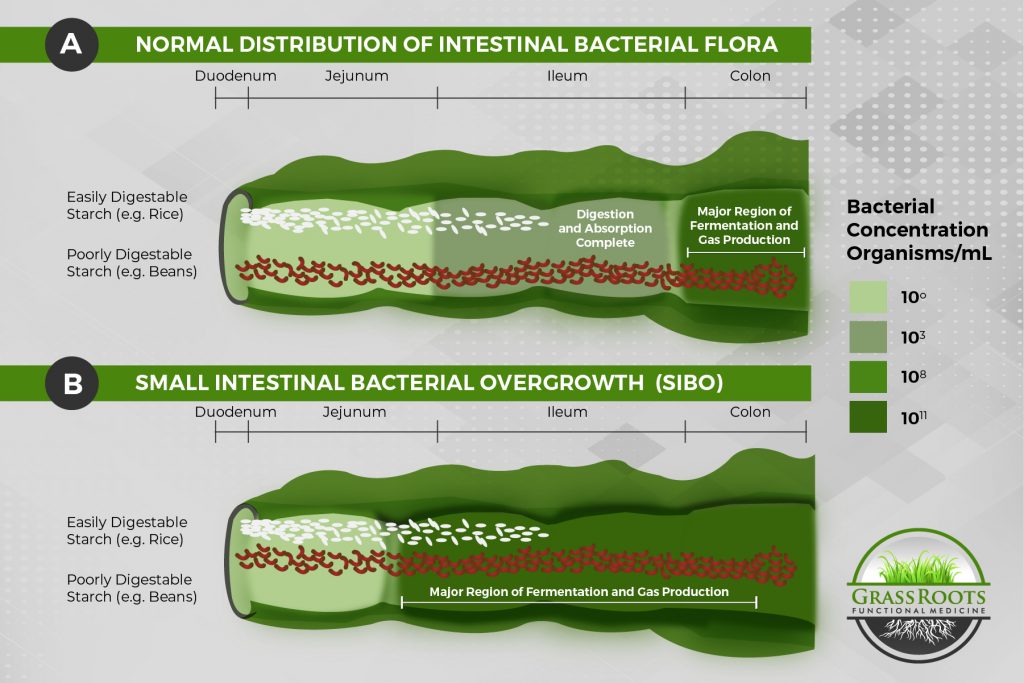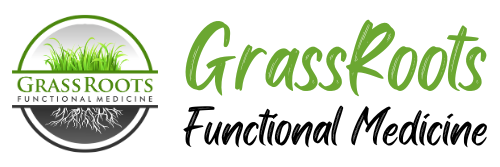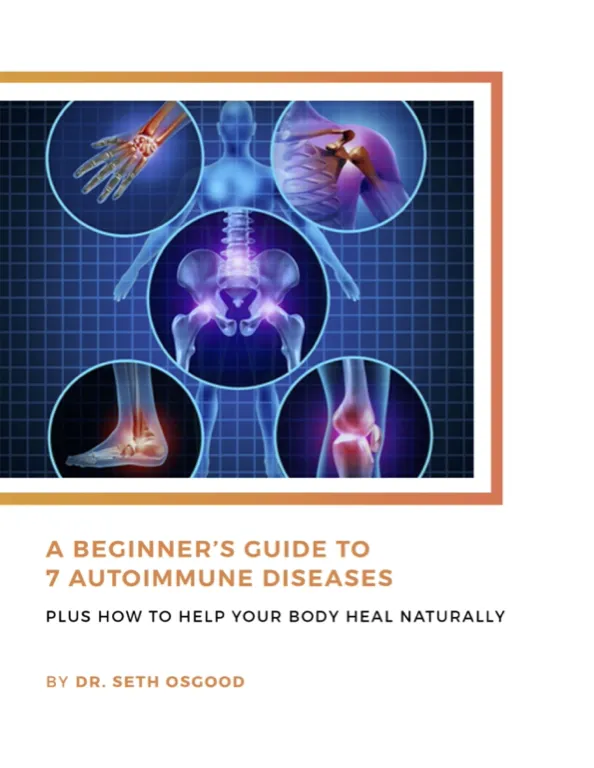Bloating, gas, diarrhea, constipation, skin issues, thyroid dysfunction, and autoimmune disease…these are all symptoms and risk factors for SIBO or Small Intestinal Bacterial Overgrowth.
In fact, SIBO is one of the most common conditions I see in my clinic.
In some patients, it’s the primary condition, especially in anyone struggling with IBS. New research has even shown that 50% of all IBS cases are actually undiagnosed SIBO.
However, it’s also often a root cause of larger and more complex conditions, including chronic infections, toxic exposures, Hashimoto’s and other autoimmune diseases.
It is not uncommon for SIBO to be the culprit that triggers skin conditions such as rosacea, eczema, and other rashes.
What is SIBO?
As the name suggests, SIBO occurs when you have an overgrowth of bacteria in your small intestine, where you absorb most of your nutrients.
While your gut microbiome contains trillions of bacteria, your small intestine should only contain a very small amount of flora. Most of your beneficial bacteria lives in your large intestine or colon, where it helps you break down food, eliminate waste, support metabolic function along with a whole host of other important roles to maintain optimal wellness.

The problem happens when these otherwise friendly bacteria take over and colonize the small intestine, where they don’t belong.
Once that occurs, anytime you eat starchy foods like bread, rice, pasta, and even healthy foods like apples, sweet potatoes or garlic, the bacteria ferment the sugars in them, producing gas.
Signs & Symptoms of SIBO
And all of that gas leads to serious bloating. Whenever a patient comes into my office and says they wake up with a flat stomach and look 5 months pregnant by dinnertime, my SIBO radar immediately goes off. Bloating is never ever normal! So if you’re experiencing loading you need to find out why!
SIBO can also lead to a long list of other symptoms as well, including diarrhea, constipation, abdominal pain, and food sensitivities, particularly Histamine Intolerance and FODMAP sensitivities.
More importantly, all of these bacteria also interfere with nutrient absorption, leading to nutrient deficiencies and the complications that go with it, including chronic fatigue.
Your gut is also where 20% of your thyroid hormones are converted from their inactive state to their active state. If your microbial balance is disrupted, this can lead to hypothyroidism, Hashimoto’s and other thyroid hormone imbalances.
Even more problematic, this overgrowth of bacteria in your small intestine can lead to intestinal permeability or leaky gut. This is where the tight junctions of your small intestine open up, allowing bacteria, toxins, viruses, and food particles to escape into your bloodstream.
And, all of these foreign particles that don’t belong trigger a big spike in inflammation and can lead to autoimmune diseases, such as Lupus, rheumatoid arthritis, multiple sclerosis, and many others.
As you can see, this one issue can quickly cascade into many other serious problems.
What Causes SIBO?
SIBO can be caused by a number of different factors, including low stomach acid, a diet high in carbohydrates and processed foods, taking antibiotics, nerve or muscle damage in the small intestine, stress, infections, toxic exposures, and constipation to name a few!
If you suspect you may have SIBO, your doctor can order a breath test that measures the level of gasses produced by the bacteria to determine if you have an overgrowth that is contributing to your symptoms. You can also do an organic acid test to look for evidence of Small Intestine Fungal Overgrowth, which is known as SIFO. Both conditions will often go hand-in-hand, so it is important to have the full picture before initiating treatment.
How to Treat SIBO
At GrassRoots Functional Medicine, we will often use a combination of two herbal supplements that help kill both bacterial and fungal overgrowth: SIBOcide and CandiCide. These supplements contain a blend of herbs that attack the pathogens without compromising the good bacteria in other areas of your GI tract. This combination has been shown to be as effective, if not more effective than the leading SIBO pharmaceutical many doctors use called Xifaxin.
We also use a dietary protocol to starve the bacteria of the carbohydrates and sugars they feed off of while you restore your microbial balance.
And most importantly, we look at the environmental factors like diet, stress, and medications that caused the SIBO in the first place, so that you can eliminate it for good. Once your gut balance is restored, the digestive symptoms disappear, and you can begin your recovery from the cascade of other problems it may have caused.
If you’re ready to get to the bottom of your symptoms and believe SIBO may be to blame, check out our Adaptation Program and schedule your free, 10-minute discovery call with me.
About the Author: Dr. Seth Osgood is a Doctor of Nursing Practice, Board Certified Family Nurse Practitioner and Institute of Functional Medicine (IFM) Certified Practitioner. Dr. Osgood received his post-graduate training in Functional Medicine through the IFM and from working with Dr. Amy Myers. He has helped people from around the world improve their health utilizing a Functional Medicine approach.
Want to work with Dr. Osgood? Become a patient in our West Lebanon, New Hampshire Functional Medicine clinic, our Burlington, Vermont Functional Medicine clinic, or our Austin, Texas Functional Medicine clinic!






0 Comments